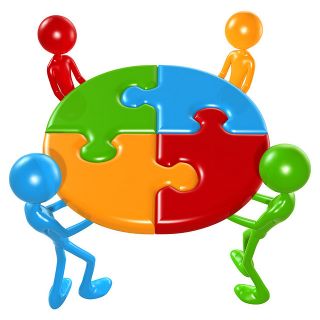Relationships
Your Kid Has a Mental Health Disorder?
Here are 12 resolutions to make the new year a better one.
Posted January 1, 2015
1. Network, baby!

Like it or not, this is a job. So do what you do when you need work, or want to make an occupational change for the better? You put out your feelers. Login to Linkedin. Email old colleagues and bosses. Chat up everyone you meet, in case they’ve got a lead.
Well, then--do the same stuff, but do it for your kid. Find people who know people who can help you get your child, teen, or young adult to a better place--emotional, educational, or physical. NAMI.org (National Alliance for Mental Illness) is a good place to start. So is your child’s primary care physician or mental health counselor. And so is the internet, which is full of blogs and websites and discussion groups for people just like me and you. Even starting conversations in the schoolyard or the supermarket can net you some fellow travellers. Be open, alert, and ready to talk or listen.
Easy for me to say, right? Well, it took me a couple of hours to write this post, so not exactly easy--but a helluvalot easier than it was (and is) to actually do it. No one said parenting of any sort was going to be a breeze. The parenting we do? Man, we are in the trenches of helplessness, struggle, and despair. But we are bulldog-strong. And if I am writing this and you are reading it? Looks like we are still standing.
2. Just. Say. No.
Go on, say it. NO. When’s the last time you erected a boundary between yourself and all the people who want a metaphorical piece of you? When you were three? Yep, that’s what I thought. Well, it’s never too late to mend your ways. Look--you’re already working AT LEAST one full-time job, maybe three. You may or may not be paid for all the work you can’t weasel out of, so why take on more? I KNOW you want to volunteer at all your kids’ schools, bake something nut-free-casein-free-gluten-free and terribly nutritious for the girl scouts bake sale. I’m sure you’re already feeling guilty about the Smiths’ annual invitation to tend to their cat posse while they’re enjoying a holiday at their home away from home in Aruba. BUT WHY?? I have no idea, although I feel the same way those things. But NO rolls right off the tongue if you let it. There’s a reason it’s one of the first and favorite words of brand-new walkers and talkers: it’s easy to say and it packs a punch. “NO” GIVES YOU POWER. So say it. Sing it. Whisper it. Shout it. And mime it, if you dare.
Well done! Now you may have a nut-casein-gluten-and sugar-filled cookie, fresh out of the mass-produced box.
3. Develop a thick skin, pronto.
It is a truth generally acknowledged, that the world at large will make you feel like IT feels like you’re a crappy parent--and do so as often as possible. On bad days you will believe the world at large is correct. But here’s the thing: chances are (if you’re reading this blog, anyhow) you are doing as much and as well as you can at any given moment. Are you making mistakes? I hope so, because if not, you just might be a cyborg. Are you learning from them? I hope so, although that fact could point in either direction.
Well, let’s assume, for the sake of argument, that you are human.
Some people are inevitably going to glare at you when your child “acts” out. They will whisper behind your back. They will exclude your kid from their kids’ parties. They will do their best to humiliate you in public. Are these people bad people? I have no idea, but they are out there and they will find you.
When they do, you will have to make a quick calculation. What’s the likely return on investment if I make this a teaching moment? Will I get arrested if I sock this person in the nose? And my favorite: If I burst into tears or throw up (or both) right here in the canned foods aisle of this supermarket, will I EVER BE ABLE TO SHOP HERE AGAIN? Because driving to the next town over is not doing anyone except my tormentor any favors.
Of course, some segments of the world at large are generous and kind. They cultivate empathy. They want to learn. Some are even walking the same thorny path we are. But just for the days those good folk are nowhere to be found, practice the art of pretending you and your child are all alone and surrounded by silence. And silently repeat an empowering mantra, such as “I am who I am. Jennifer is who she is. And my love for both of us is our cloak of invincibility.” Then go directly for the chocolate--preferably the German or Swiss stuff.
4. Declare a “Me” day at least once in 2015.
I declared December 23rd, 2014 “Deb Day.” It was awesome, and included some pedicure action and a juice bar and TJ Maxx and a lot of chocolate. Hey--if I didn’t do it, who would have? And it only took me 10 years to invent the concept. I’m looking forward to December 23rd, 2015. And maybe a half-Deb Day in July?
5. Barter with family and friends.
hate to presume, but I’m guessing that at least half of you in my orbit are feeling a little pain in the purse region. (What? No! That was not at all what I meant--shame on you!;) But seriously, disability of any kind is expensive. Parents of children with severe psychiatric disorders are likely to be underemployed. Or living, by necessity, in one-income households. Some of us have had to cash out our retirement accounts, refinance our homes (if we haven’t lost them), or sell our valuable belongings, if we’re lucky enough to own anything saleable.
So what’s a parent to do when the bathroom sink has been leaking for six months, and by the smell of things Mold has purchased real estate in the base of the vanity cabinet, and moved its extended family in? Or when the car’s in the shop and the kid’s in the hospital, and the hospital is not on the bus route?
Figure out a trade. If you’ve been doing the kind of parenting I think you have, then you are canny. And resilient. You’ve been around the block a couple hundred times and you’re working on that thick skin and a killer mantra.
That means you’ve got some mad skillz, even if you don’t think you do. Why not offer your super-handy brother a motherlode of yummy casseroles for the freezer if he’ll fix your sink? Or the gift of addressing all 150 of his daughter’s Bat Mitzvah invitations in your beautiful calligraphy? I bet you have all kinds of good stuff to trade people for their good stuff. This is the currency of community and goodwill. Using it makes you feel good. And it can make you feel better in the ol’ purse region.
6. Learn the art and science of research.
As I have publicly announced on more than one occasion: “Google is not your friend. At best, Google is your Frenemy.” (Man, I love that line. I know it’s uncool to quote yourself, but that’s one you’ll probably hear on and off until I come up with something better. To anticipate your question: yes, I’m working on it.)
It’s true enough that Google is your Frenemy, but while you’re developing your thick skin and working toward your honorary medical and social work degrees, you can learn how to work collegially with the old chap.
The more you know about your child’s condition, the better you can advocate for him. As is the case in any arena, the more informed you are as consumer, the more likely you are to get what he needs, with fewer regrets. Whatever you do, take what you read with a grain of salt. Just because you’ve had a few weeks of bad sleep doesn’t mean you’ve got Fatal Familial Insomnia. (Trust me on this. DO NOT GET FIXATED ON FATAL FAMILIAL INSOMNIA.) And the fact that your twelve year old has started talking to herself while on the toilet does not mean she’s developing psychosis. It could mean that, but it probably doesn’t. In order to beat Google at its own game you have to read widely and wisely. Know what websites you can trust. WebMD is a vast and readable resource. So is the Mayo Clinic website--and really, so are the websites of any major hospital. You may lack the skills needed to diagnosis your kid, but you sure can parse these sources for questions to run by your child’s clinicians.
Also, see #1 above. (Network, baby!) The “six-degrees of separation” principle pretty much guarantees that you’ve got a mental health care expert in your galaxy. Seek that person out and offer to barter homemade banana walnut muffins for twenty minutes of access to their brain.
7. Figure out what fills your well. Do it. Repeat as often as possible.

Steal 20 minutes when your kid(s) are at school, sleeping, whatever, and sketch the cat. Read. Take a hot bath. Just forget the dishes in the sink! Pretend you didn’t see where the dog had an accident or the dried maple syrup glinting on the coffee table, and do something nice. Meditate. Call your best friend and bribe/beg him or her to come over for coffee. Call your significant other home from work on false pretenses and seduce her or him (best not done when your kid(s) are napping). Or bake yourself a mug brownie? I’m running out of ideas--I’ll let you take over from here.
8. DO NOT be duped by what you see on TV!
Contrary to the notion our media industry tries to sell us, most of us in this world are not flawless--on the outside or the inside. We have belly fat. We snore. We grow pimples and skin tags. We get annoyed at our kids, whether they deserve it or not. We daydream about buying a vintage mustang convertible and driving (alone) to the far coast--with one map and without a damned itinerary.
f we are unlucky enough to have, say, rheumatoid arthritis, it’s unlikely we’re bouncing around all day on our supple and slender extremities, no matter what the actress in the commercial seems to be doing.
Don’t fall for it, because it will make you feel like a loser. Oh, and what you see on sitcoms or commercials is not even remotely true. If it were, wouldn’t we ALL wish we (or our partner) needed a daily dose of ED medication? I mean, erectile dysfunction would be a small price to pay for those leisured lives, good looks, and awesome accessories, wouldn’t it?
Hell-o, Airstream! Come to Mama!
My favorite commercial to hate is the one that sells financial security to parents of special needs kids. You know, people like me, maybe like you. That beautiful blond mom, who never once looks tired or sad or like she’s wearing the same smelly T-shirt she’s slept in the past three nights, while devoting all of her waking moments to her disabled child (all 2 minutes of the ones we get to watch, anyway). Her gorgeous and non-specifically disabled blond child. Their spacious and uncluttered blond home.
Hey--how can I get me some of that?? What--I can’t? Oh...yeah.
Look, we’re doing the near-impossible. We’re canny. Deep inside we know that stuff is not true, even if we wish it was. It’s beautiful, excellent advertising, and it does what it’s supposed to do. I hope the folks who write this stuff are well-paid. But if we let it get under our skin it will eat us alive.
Maybe it’s time to binge-watch “Breaking Bad” or “The Walking Dead?” Or else, just turn off the TV.
9. Learn how to be your child’s advocate--at school, at the doctor’s office, out in the world.
This one is hard. But it’s related to #6, so maybe you can kill two proverbial birds with one stone.
The Googlemeister can help. So can mental health organizations like NAMI.org. And so can the parents, in your community and beyond, who have already done it. Ask your school district’s SPED administrators for the names of families who might be good models and who can direct you to resources. Learn the specialized languages used by clinicians and educators. Practice parsing IEPs. Like I said, it’s not easy. But like I also said, this is a full-time job. Which sucks, because you probably have other part- or full-time jobs.
Don’t assume that your child’s teacher or clinician is always right, just because of the letters they plunk down after their name. They’re human. The best of the best still sometimes make mistakes. Otherwise they’d be...wait for it...cyborgs. (I know, this cyborg thing is becoming old. I’ll try to retire it and find another joke when I take a break from doing all the things I’m making you do.)
Ask questions. Bring paper and pens, or a laptop, to all meetings. Write things down and then go home and look them up. Call or email the educator or clinician to ask for clarification or suggest alternatives.
THIS IS ACCEPTABLE BEHAVIOR. It’s their job to serve your child and you. They’re paid for it--unlike you and me. So why not act like the customer you are? Better yet, think of yourself as a PARTNER in ensuring your child’s health and well-being. And then find a way to be one. Because if you don't, whoever does will lack the love and fear and joy and investment you'll inevitably put into the endeavor.
Most important of all, remember this: cocktails are allowed after 4 p.m. in the winter. I mean, it’s dark out, right?
10. Pay it forward!
Number 10 is related to #1. You’ve begun to construct a network of other parents and caregivers to young people with mental health disorders. And that network is going to grow. You’ll get emails from people saying things like, “Hey--my sister-in-law’s nephew is hurting himself. Could I give her your number?”
The answer is always YES, unless your own family is too acutely in crisis for you to lend a hand at that moment. Then, refer to #2 and Just. Say. No. But unlike your NO to the bake sale organizer or the posse of cats, this one is temporary.
“I’m sorry, I can’t right now because my own child is not safe. Please let your sister-in-law know that I’ll be glad to talk to her when we get things under control. In the meantime, my friend Jake would probably be happy to help. Here’s his contact info--have her tell him I sent her. And good luck!”
I can tell you from personal experience that paying it forward pays off. First of all, it makes you feel good and feel useful. Second, it’s a way to honor the people who paid it forward to you, when you were wet behind the ears and just finding your own networks. And third, that person you helped out in her time of emotional need and dazed bewilderment will never forget it.
It’s called Karma, baby! What goes around comes around. So make it good...what comes back at you might even be a lifesaver.
11. Check in with the rest of your family.
Learn from my mistake: don’t assume that the sibling who looks and acts OK really IS OK. Don’t assume that no one else in your circle of loved ones needs you--or that you don’t need them. Serious illness--physical or emotional--affects everyone in the family. EVERYONE. Even the dog will take on the malaise and stress of a household in crisis.
And when all three or four or six of you are going down together, it’s not pretty.
Make it a habit to check in daily. At breakfast (if you happen to eat breakfast together--does any American family do that anymore?). At bedtime. Whenever. Persist, but not obnoxiously. Be sensitive to others’ needs. If there’s a healthy teen in your house you will probably meet resistance to your check-in efforts. I tried for a while to convince my “typical” daughter to attend a siblings' group, or to see her own therapist. I met with more rolled eyes and sarcastic remarks than I can count on all eight of my tentacles, so I allowed myself to think she was fine. But when Benjy left for his therapeutic school, Saskia found ways to let me know she really, really wasn’t. And Lars and I were finally able to discuss and attend to our own wounds. We’d let this stuff slip because we were busy saving our younger child's life. In hindsight I think we might have done things differently and better.
12. Find ways to let your struggling child, teen, or dependent of any age how much you cherish them.

Your loved one has a psychiatric disorder. He or she did not ask for this, and neither did you. Who would, for Pete’s sake? Whether there are two of you fighting the good fight or three or five or ten, you’re all in it together. It hurts like hell. It costs too much money. It robs you of sleep and stresses you out beyond all human limits. (Since you are not cyborgs, that is like suffering the agonies of the rack--in body and spirit both.)
I know it sounds corny, but Love helps. It does. Platonic or romantic or filial or parental or sibling love. Doesn’t matter, it’s all a healing balm. Spread it around generously. And wrap your wounded hearts in a gauze of generosity and forgiveness--for yourself, for each other, for the universe that dealt you a crappy hand.
I wish all of you a New Year that is better, by an inch, a mile, or an infinitude, than the last one!




